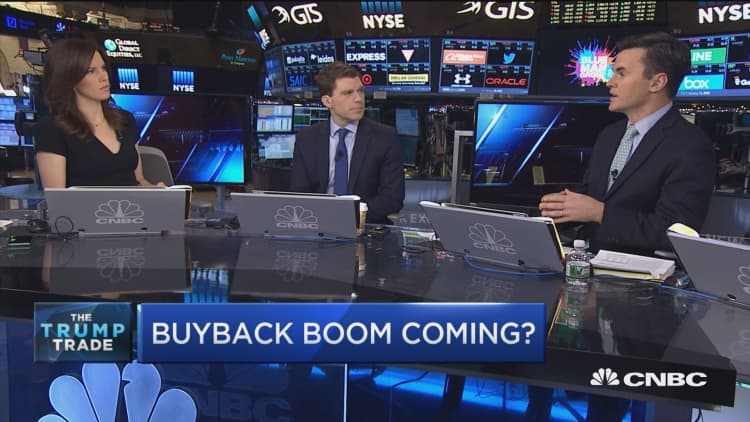Stock buybacks, a principal driver of the bull market that began in March 2009, are on the wane.
Share repurchases slid to $112.2 billion in the third quarter, a 12 percent decline from the previous three-month period and a 25.5 percent tumble from the same period a year before, according to figures released Thursday by S&P Dow Jones Indices.
The total reached its historic high in the second quarter of 2007, around the time of what also marked a peak in stock prices. Buybacks fell through the first quarter of 2009, then increased gradually and helped trigger the second-longest bull market in history. The surge came amid historically low interest rates that made it easy to borrow cash returned to shareholders.
The buybacks total peaked out just short of a record in the first quarter of 2016, then fell through the year. The Q3 levels represented a 30.5 percent decline from the Q1 total of $161.4 billion, according to S&P.
Despite the pullback, the market hasn't seemed to mind. The is nearing the end of another strong year, with the index up just shy of 10 percent as of Thursday afternoon trading.
The withdrawal comes at a time when investors increasingly are demanding that companies use their cash stockpiles for purposes other than buybacks, dividends and deal-making. They're looking for more attention to longer-term strategies like capital purchases, research and development and hiring.
S&P 500 companies excluding financials, transportation and utilities are holding $1.49 trillion in cash, an increase of 8.2 percent over the second quarter.

"The ability of companies to increase buybacks remains high, as cash jumped to a record level, with money remaining relatively cheap and easily accessible," said Howard Silverblatt, senior index analyst at S&P Dow Jones Indices. "However, the cessation of momentum since Q1 2016 may indicate that companies do not currently want to increase planned buybacks."
More than 20 percent of the index's companies cut share count by at least 4 percent, a significant contribution to earnings per share that grew 3.1 percent overall, ending a profits recession.
The amount of companies engaging in buybacks remains concentrated at the top. The biggest 20 companies accounted for 42.3 percent of the total buybacks.
On a sector basis, tech led the way with $26 billion. Apple was by far the biggest repurchaser, allocating $6 billion, while Microsoft was next with $4.4 billion. Apple's total was less than half the amount for the same period in 2015.


